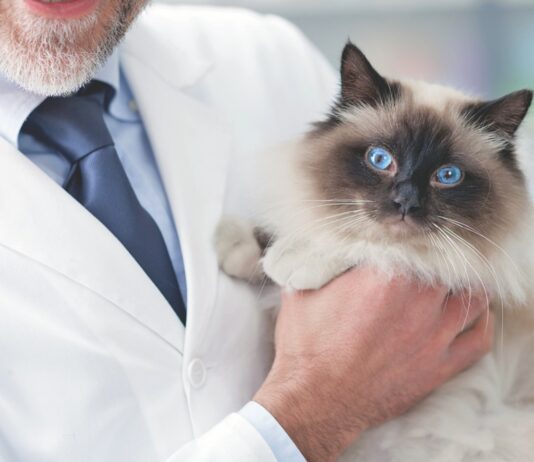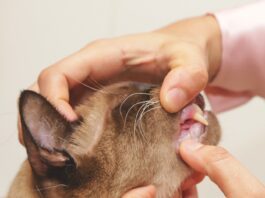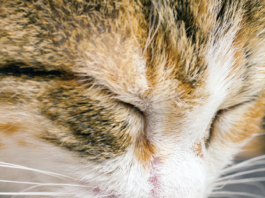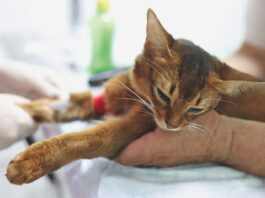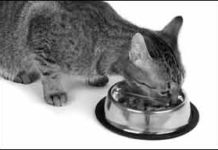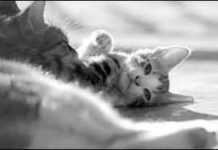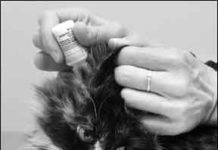Looking Beyond the Food Bowl
Bringing out the nutritional best in your cat goes beyond the food in the bowl. Frequency of meals, location, post-meal bowl cleaning and other environmental factors also influence his health. “One of the biggest problems is that far too many people overfeed their cats, and the cats become overweight and some even become obese,” says nutritionist Joseph Wakshlag, DVM, Ph.D., Associate Professor of Clinical Nutrition at Cornell University College of Veterinary Medicine. “Dogs give you those begging eyes when you sit down to eat, but in most cases, you can get them to go into another room and leave you alone.” They excel at begging. “Cats, however, are aggressive beggars. They will keep purring and meowing. If you tell them to go away, they will just come right back and start meowing again. They are more persistent than dogs and far too often, the person gets frustrated and will get up and put more food in their bowls.”
Ask Elizabeth: September 2012
I work at a large no-kill animal sanctuary with special-needs cats. Often when one becomes ill and stops eating, we tempt him or her with people food like baby food or boiled chicken. I have heard a lot of conflicting things about feeding cats baby food or straight meat. Someone recently told me that a good all-meat baby food and straight chicken are nutritionally complete, but I have read in a few places that cats need other nutrients like taurine and vitamins A and D or they will get very sick. Does straight meat provide full nutrition for cats? In the wild, how do cats get full nutrition if meat does not provide it all? What is the best kind of food for our dear kitties?
Understand the Risk of Glaucoma
The eye is an amazing, delicate organ. Cells within the eye normally produce a clear fluid (aqueous humor) that serves to nourish and maintain the shape of the eye. When the balance between the production and the drainage of fluid is upset, glaucoma can result. Decreased drainage of fluid causes increased pressure (and pain) within the eye, often resulting in damage to the optic nerve and, consequently, loss of vision. While glaucoma is much less common in cats than in dogs, it still poses the same high risk of blindness if left untreated. In fact, even if diagnosed early on, treatment is not always successful.
Short Takes: August 2012
Most “trap-neuter-return” feral cat groups provide vaccines and other veterinary services prior to releasing them, according to a survey of 120 such groups conducted by Alley Cat Rescue, a feral cat TNR advocacy group.Ninety-six percent of the groups provide rabies vaccinations, while 64 percent provide distemper vaccinations. Twelve percent provide feline leukemia shots, 62 percent deworm feral cats and 64 percent provide flea treatment.The majority (96 percent) of feral cat groups neuter stray cats before placing them in homes, and most groups also provide spay and neuter services to owned cats to prevent future colonies from forming, according to Alley Cat Rescue. Feral cat groups’ efforts to educate the public about trap-neuter-release programs have been productive, with 65 percent of respondents calling their education efforts “somewhat” effective, and 18 percent finding their efforts extremely successful. Most animal control agencies do not offer trap-neuter-release programs (61 percent), and one in three agencies have trapped and killed whole colonies, according to respondents.
Feline Upper Respiratory Infections
Your seven-year-old cat is a generally healthy animal. Except for a fleeting bout of gastrointestinal upset a few years ago, shes never had a really serious sick-day in her life. But your neighbors cat always seems to be ill. Every couple of months, she shows up on your doorstep wheezing and sneezing. Her eyes are red and watery, and she acts lethargic. These disturbing signs persist for a week or so, but then she seems to be okay again - for a while. Its quite likely that the cat next door is suffering from an upper respiratory infection, a highly contagious disease affecting her nose, sinuses, pharynx and larynx - the structures that filter, heat and dehumidify inhaled air before it flows to her lungs. Why is it, you wonder, that your cat never experiences this problem, while the cat next door cant shake it?
Understand Intestinal Disorders
Of all feline health problems, intestinal disorders rank among those most frequently treated by veterinarians at local clinics and large referral hospitals throughout the U.S. According to Melanie Craven, BVM, an internist and researcher in gastroenterology at Cornell University’s College of Veterinary Medicine, vomiting, diarrhea and dramatic weight loss are the most common signs of feline intestinal disease in cats. However, she notes, subtler signs such as lethargy and appetite fluctuations can also suggest the presence of an intestinal disorder.
Is Your Aging Cat Slowing Down?
At the age of 12, your cat seems to be slowing down a bit, and that could be perfectly normal. After all, a cat of her age — equivalent to the age of 65 or so in a human — has been living a full life and deserves to take it easy on herself. Nevertheless, it’s a good idea to have the animal checked out by your veterinarian. It’s quite possible that her diminished activity is a consequence not only of her advancing age, but of a debilitating pain in one or more of her joints.
Short Takes: July 2012
Lymphoma is the most common cancer diagnosed in cats, and while several prognostic factors have been documented, another factor recently considered to be important is weight loss. Body weight over time may be a simple, objective and useful marker of patient status.
Ask Elizabeth: July 2012
Dear Elizabeth: We adopted a new kitten from a local rescue group last month, and she is just perfect. Although she had been tested for the leukemia virus and FIV by the terrific group that saved her from the street, we took her to our veterinarian right away so that she could be examined before we introduced her to our two older cats. After a clean bill of health, we brought Bunny home, and she has become part of the family. The problem is that before we scheduled her spay surgery, she came into heat. What a scene!
Grants to Study FIP and Other Diseases
Investigations into potential treatments for feline infectious peritonitis (FIP), hypertrophic cardiomyopathy and chronic kidney disease were among ten projects selected by the Winn Feline Foundation from 44 proposals to receive $174,018 in funding. The investigation by Belgium researchers to evaluate the efficacy of a treatment for feline infectious peritonitis received the most funding at $24,962.
Your Cat’s Hearing: Is It Failing?
Among all acquired feline ear disorders, the most common by far is otitis externa, an infection of the outer ear canal that, if left untreated, can progress to the inner ear, damage the ear drum and seriously compromise an animal’s hearing as well as its sense of balance. The most common cause of this unpleasant condition and its potentially deafening consequences is an assault on the ear by an outside invader, the ear mite. In some cases, however, the culprit is an organism that normally resides harmlessly within a cat’s ear — a one-celled fungus, or yeast, known as Malessezia.
Your Cats Hearing: Is It Failing?
Among all acquired feline ear disorders, the most common by far is otitis externa, an infection of the outer ear canal that, if left untreated, can progress to the inner ear, damage the ear drum and seriously compromise an animal’s hearing as well as its sense of balance. The most common cause of this unpleasant condition and its potentially deafening consequences is an assault on the ear by an outside invader, the ear mite. In some cases, however, the culprit is an organism that normally resides harmlessly within a cat’s ear — a one-celled fungus, or yeast, known as Malessezia.

